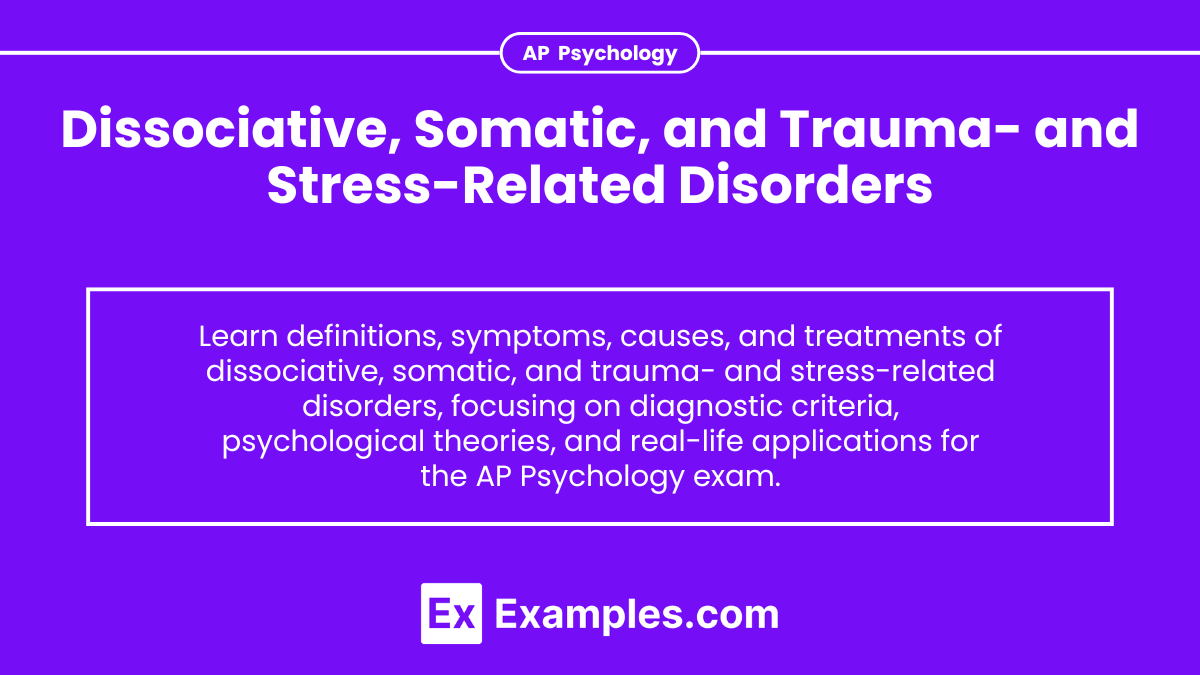Explore dissociative, somatic, and trauma- and stress-related disorders, which impact mental health through symptoms like memory disruption, physical ailments without medical cause, and severe anxiety following trauma. These disorders include Dissociative Identity Disorder, Somatic Symptom Disorder, and PTSD, each with unique diagnostic criteria and treatment approaches. Understanding these disorders is crucial for recognizing the complex interplay between psychological trauma, stress, and physical symptoms, essential for mastering the AP Psychology curriculum.
Learning Objectives
Focus on understanding the definitions, symptoms, causes, and treatments of dissociative, somatic, and trauma- and stress-related disorders. Learn to differentiate between various disorders like Dissociative Identity Disorder, Somatic Symptom Disorder, PTSD, and Acute Stress Disorder. Study the psychological theories and research underlying these disorders, and be able to apply this knowledge to real-life examples and case studies. Master the vocabulary and diagnostic criteria used by psychologists to assess and treat these conditions.
Dissociative Disorders

Dissociative disorders involve disruptions or discontinuity in consciousness, memory, identity, or perception. They often stem from trauma and can severely impact a person’s functioning, making decision criteria crucial for accurate diagnosis and treatment.
Types of Dissociative Disorders
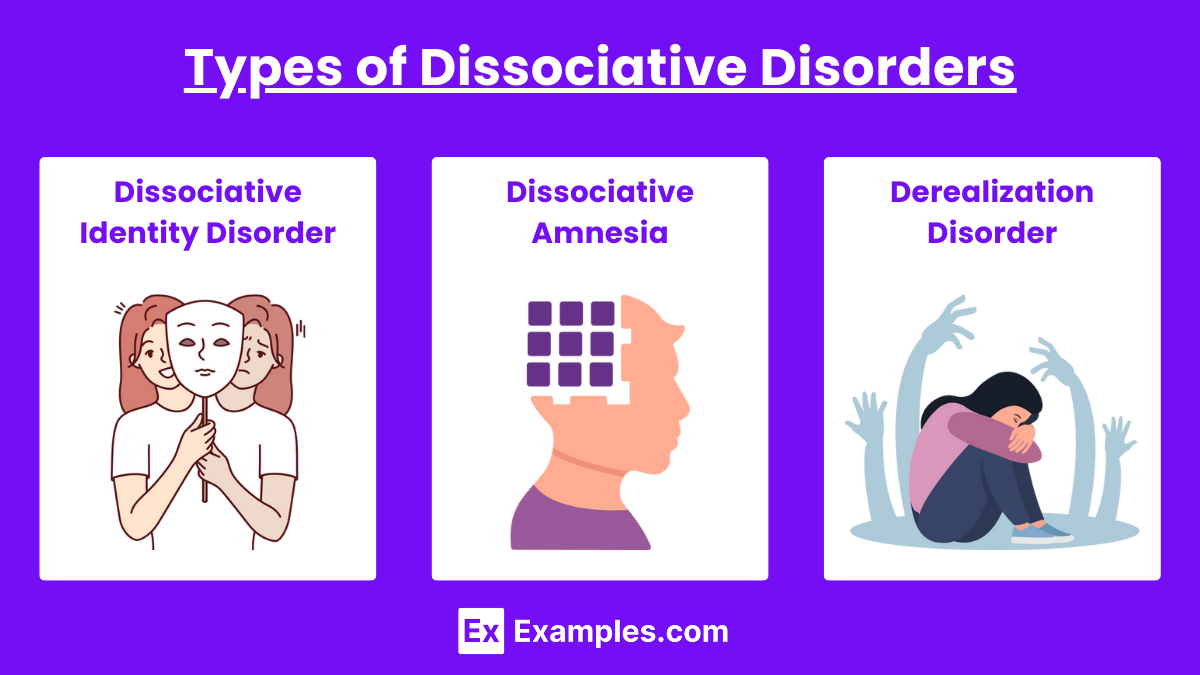
- Dissociative Identity Disorder (DID)
- Definition: Presence of two or more distinct personality states.
- Symptoms: Memory gaps, feeling detached from self, different behaviors, attitudes, and emotions.
- Causes: Severe trauma during early childhood, usually extreme, repetitive physical, sexual, or emotional abuse.
- Dissociative Amnesia
- Definition: Inability to recall important personal information, usually of a traumatic or stressful nature.
- Types:
- Localized Amnesia: Unable to recall events from a specific period.
- Selective Amnesia: Recall some, but not all events from a specific period.
- Generalized Amnesia: Complete loss of memory for one’s life history.
- Causes: Trauma or severe stress.
- Depersonalization/Derealization Disorder
- Definition: Persistent feelings of detachment from one’s body (depersonalization) or from the environment (derealization).
- Symptoms: Feeling like an outside observer of one’s life, feeling detached from surroundings, emotional or physical numbness.
- Causes: Severe stress, trauma, substance abuse, or other mental health disorders.
Somatic Symptom and Related Disorders
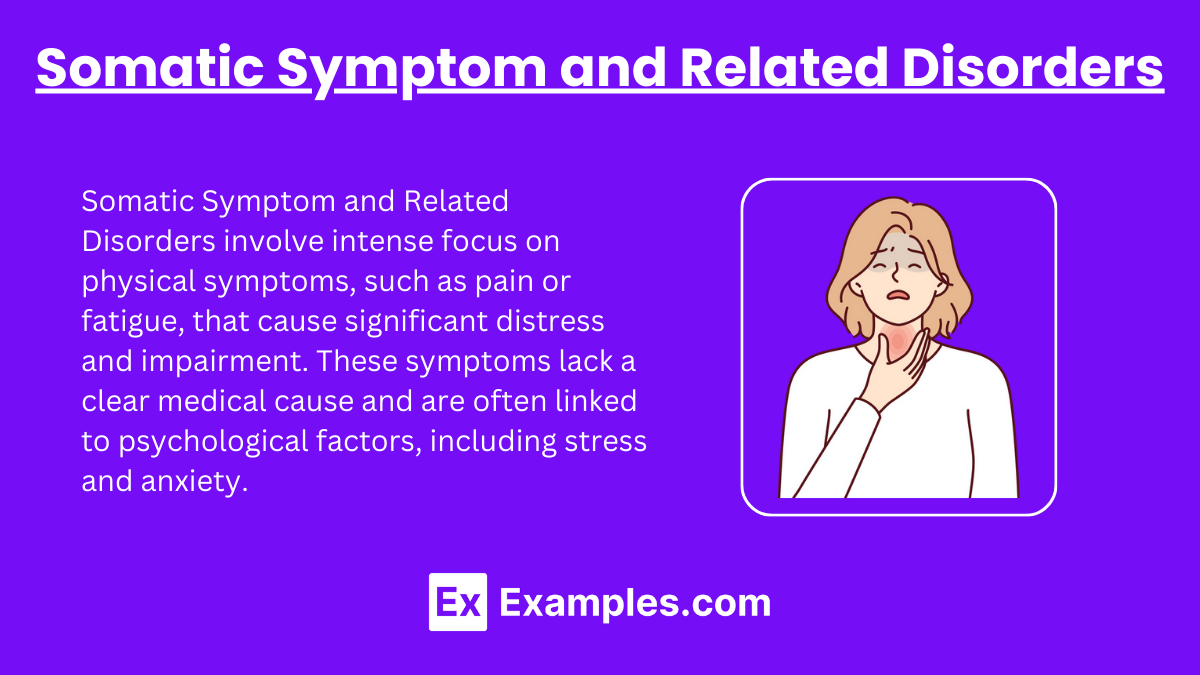
These disorders are characterized by an intense focus on physical (somatic) symptoms that cause significant distress and impair daily functioning.
Types of Somatic Symptom and Related Disorders
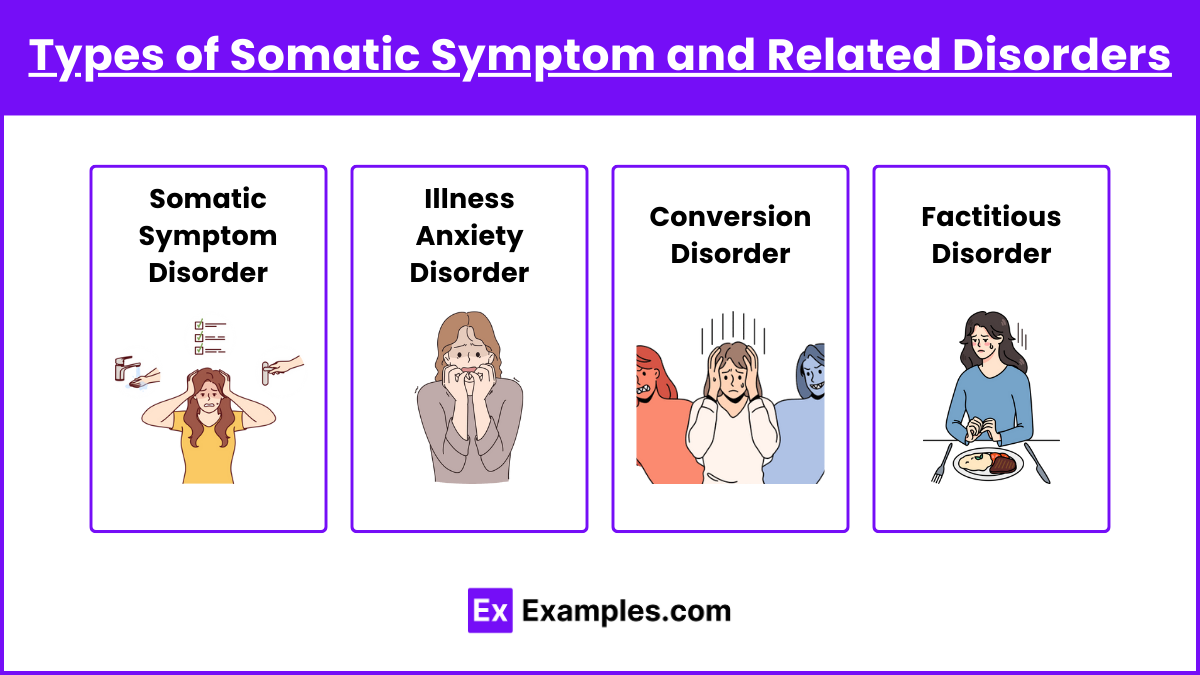
- Somatic Symptom Disorder
- Definition: One or more somatic symptoms causing excessive thoughts, feelings, and behaviors related to the symptoms.
- Symptoms: Persistent pain, fatigue, or other physical complaints without a clear medical cause.
- Causes: Genetic factors, family influence, and a learned behavior pattern.
- Illness Anxiety Disorder (Hypochondriasis)
- Definition: Preoccupation with having or acquiring a serious illness.
- Symptoms: High anxiety about health, frequent health checks, or avoidance of medical care can significantly hinder self-care routines.
- Causes: Past experiences with illness, heightened sensitivity to bodily sensations, or significant stress.
- Conversion Disorder (Functional Neurological Symptom Disorder)
- Definition: Neurological symptoms that are incompatible with medical explanations.
- Symptoms: Paralysis, blindness, or other neurological symptoms without a medical cause, related to neuron dysfunction.
- Causes: Psychological stress or trauma converting into physical symptoms.
- Factitious Disorder
- Definition: Falsification of physical or psychological symptoms or induction of injury or disease, associated with deception.
- Symptoms: Mimicking symptoms, tampering with medical tests, seeking unnecessary medical procedures.
- Causes: Desire to be seen as ill or injured for attention or sympathy.
Trauma- and Stressor-Related Disorders
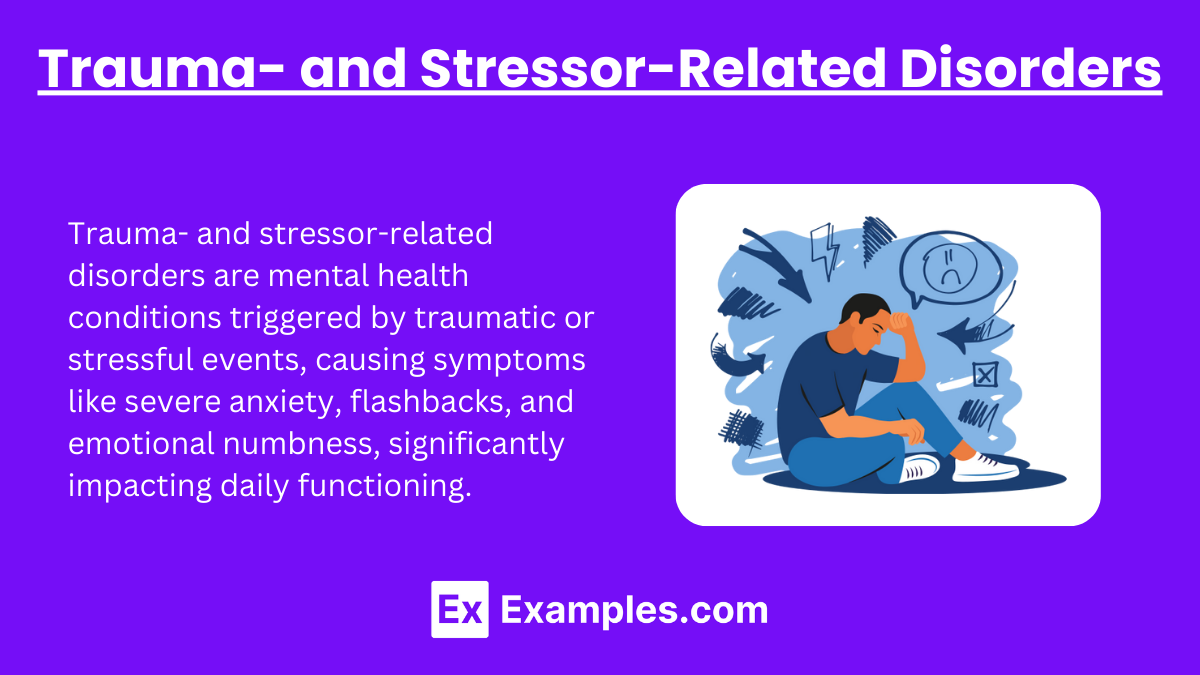
These disorders arise in response to a traumatic or stressful event and can severely affect a person’s mental health.
Types of Trauma- and Stressor-Related Disorders
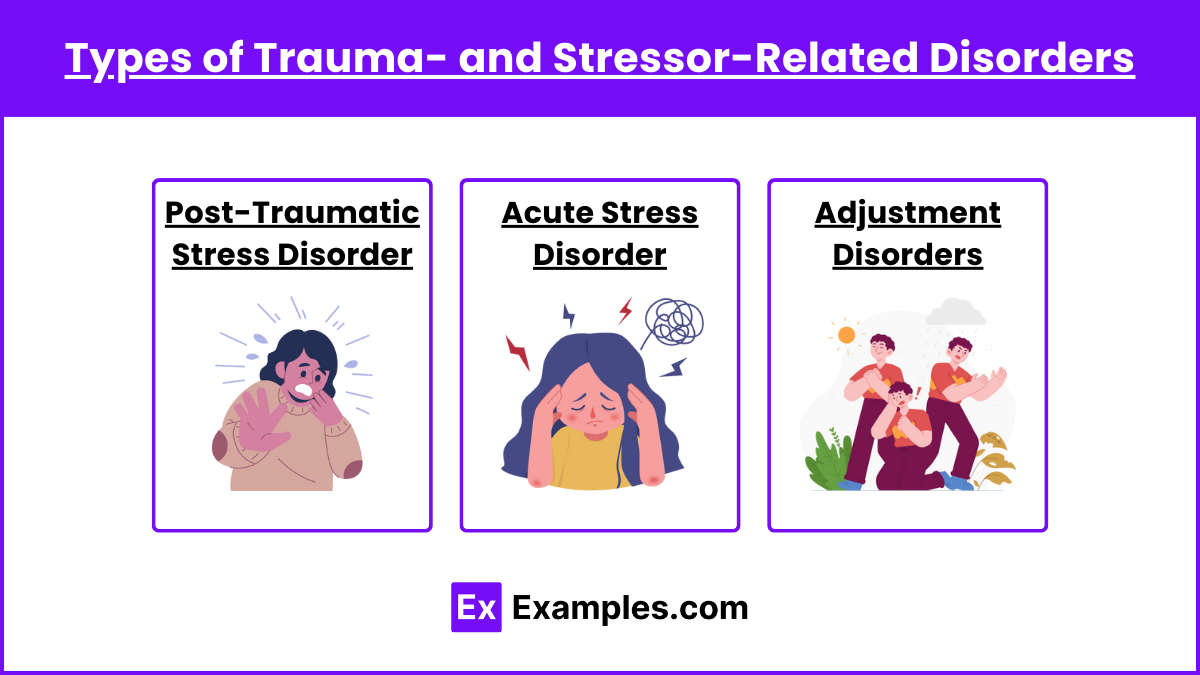
- Post-Traumatic Stress Disorder (PTSD)
- Definition: Persistent mental and emotional stress occurring as a result of injury or severe psychological shock.
- Symptoms: Intrusive memories, flashbacks, nightmares, severe anxiety, avoidance of reminders of the trauma.
- Causes: Experiencing or witnessing a traumatic event such as war, assault, or disaster.
- Acute Stress Disorder
- Definition: Symptoms similar to PTSD but occur immediately after the trauma and last for a shorter period (3 days to 1 month).
- Symptoms: Anxiety, dissociation, recurrent nightmares, flashbacks, hypervigilance.
- Causes: Exposure to a traumatic event.
- Adjustment Disorders
- Definition: Emotional or behavioral symptoms in response to an identifiable stressor occurring within three months of the stressor.
- Symptoms: Depressed mood, anxiety, disturbance of conduct, or a combination.
- Causes: Significant life changes such as divorce, Job order, or moving to a new location.
Treatment Approaches
- Psychotherapy: Cognitive-behavioral therapy (CBT), exposure therapy, and EMDR (Eye Movement Desensitization and Reprocessing).
- Medications: Antidepressants, anti-anxiety medications, and antipsychotics.
- Support Groups: Peer support and group therapy can be beneficial.
- Stress Management: Mindfulness, relaxation techniques, and healthy lifestyle choices.

